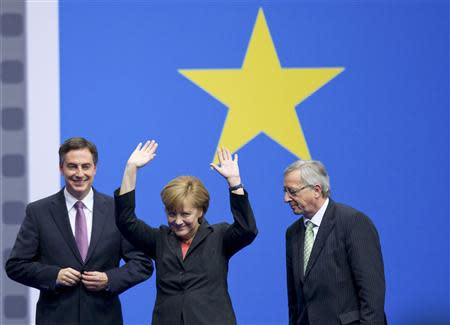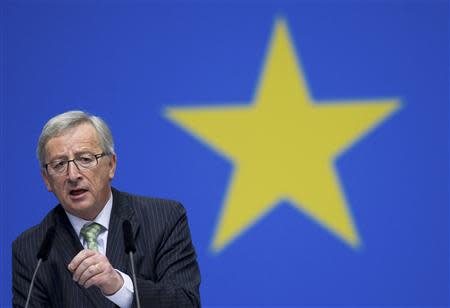Juncker launches EU campaign with soothing message to Germany
By Andreas Rinke BERLIN (Reuters) - Jean-Claude Juncker kicked off his campaign to become president of the European Commission on Saturday by reassuring sceptical German conservatives that he opposed common euro zone bonds, rapid EU enlargement and unchecked power for Brussels. The former prime minister of Luxembourg and long-time head of the Eurogroup forum of euro zone finance ministers was chosen last month as the lead candidate for Europe's centre-right parties in European Parliament elections next month. But he has not always seen eye-to-eye with Chancellor Angela Merkel, the most powerful politician in the 28-nation EU, and his speech at a congress of her Christian Democratic Union (CDU) seemed aimed at winning over the German leader and her party. One of the most sensitive issues for the CDU is Juncker's support, at the height of the bloc's debt crisis, for common euro zone bonds - a taboo for Merkel and her party who fear they would remove incentives for budget discipline. The easing of the crisis has snuffed out the debate about mutualising European debt, but Juncker still felt the need to address it on Saturday. "Let's not be torn apart by those who allege untruthfully that Juncker is not supported by the CDU because he backs euro bonds," Juncker told the congress in Berlin. "If I become European Commission president, there will be no euro bonds. There can't be euro bonds because the conditions for covering even a small portion of the debt are not fulfilled." INFLUENTIAL EU POST In the fight for the Commission presidency, currently held by Jose Manuel Barroso, Juncker is up against German Social Democrat (SPD) Martin Schulz and the Liberals' Guy Verhofstadt. The idea of choosing lead candidates for Europe's main political groupings was aimed at making the vote more relevant to citizens, who have turned out in ever smaller numbers to vote in European elections since the first were held in 1979. If the centre-right bloc emerges as the strongest, Juncker will be well positioned for the EU's most influential post, with oversight of legislation affecting 500 million Europeans. But there is still a risk, even if the centre-right comes out on top, that post-election horse-trading between EU leaders vaults someone else into the post, so Merkel's support is vital. In his speech, Juncker said the EU's executive arm should focus on the big picture - a nod to Merkel's criticism that it has gone beyond its mandate and meddled in national matters. He also criticised Turkey's banning of social media site Twitter in the run-up to recent local elections and said Europe needed an "enlargement pause" before considering adding new members -- both messages that are popular with the CDU. The CDU and its Bavarian sister party the Christian Social Union (CSU) oppose Turkey's bid to join the EU but have not blocked the accession talks which began in 2005, shortly before Merkel became chancellor. Both Juncker and Merkel, who spoke after him, said the centre-right must ensure in the looming campaign that it is not painted as the party of austerity by Schulz's socialists. In some countries, especially in southern Europe, Merkel is deeply unpopular for her insistence on public spending cuts and structural reform in return for aid at the height of the crisis. Fringe parties on the left and right are expected to do well in the EU elections, in part because many Europeans blame mainstream politicians like Merkel for high unemployment and economic weakness at home. "We need to fight against the suggestion that we are responsible for austerity -- for all the evil deeds -- and that the Socialists have a monopoly on the hearts," Juncker said. "We are as social as the Socialists and we will prove this." (Writing by Noah Barkin; Editing by Gareth Jones)

 Yahoo News
Yahoo News 

